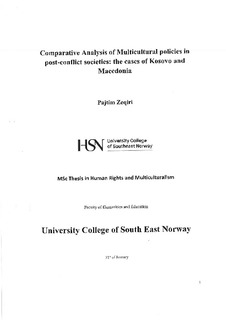| dc.description.abstract | Multiculturalism as a theory and policy in its essence aims to address the needs of national minoritites, protect them against assimilation and accommodate them in state institutions by a politics of recognition. This study aims to describe, analyze ans compare multicultural policies designed for national minorities in two post-conflict societies: Kosovo and Macedonia. The units of this analysis will be national minorities in these countries, with special emphasis on the largest ones: Kosovo Serbs and Macedonia Albanians. The study will investigate three central multicultural policies designed for national minorities: a) language policies, b) political representation, and c) employment opportunities in terms of equitable representation. In addition, it will highlight also some of the challenges in adopting multicultural policies in these post-conflict societies | nb_NO |
